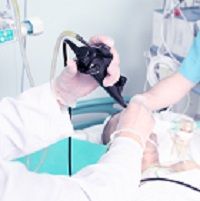FDA Issues Endoscope Warning
The Food and Drug Administration on Thursday warned physicians and medical personnel that the design of duodenoscopes makes the devices difficult to clean and thus poses a risk of transmitting infectious agents.

The Food and Drug Administration on Thursday warned physicians and medical personnel that the design of duodenoscopes makes the devices difficult to clean and thus poses a risk of transmitting infectious agents.
The advisories come as the UCLA Health System revealed that more than 100 patients may have been exposed to a “superbug” during endoscopic procedures between October 2014 and January 2015. The bug has been linked to at least 2 deaths at the facility.
Duodenoscopes, which are used for Endoscopic Retrograde Cholangiopancreatography (ERCP), are particularly difficult to reprocess (clean, disinfect, and sterilize), according to the FDA release.
“Recent medical publications and adverse event reports associate multidrug-resistant bacterial infections to patients who have undergone ERCP with reprocessed duodenoscopes, even when manufacturer reprocessing instructions are followed correctly,” the FDA advisory said.
Further, the FDA said some parts of the scopes are “extremely difficult” to access and clean.
“For example, one step of the manual cleaning instructions in device labeling is to brush the elevator area,” the FDA notes. “However, the moving parts of the elevator mechanism contain microscopic crevices that may not be reached with a brush. Residual body fluids and organic debris may remain in these crevices after cleaning and disinfection.”
The agency said the risk can be reduced by meticulously cleaning duodenoscopes prior to high-level disinfection. However, the FDA said even that won’t reduce the risk entirely.
From January 2013 to December 2014, FDA received 75 medical device reports relating to 135 patients relating to possible microbial transmission from reprocessed duodenoscopes, though the agency said it’s possible more cases went unreported.
The FDA it’s working with the Centers for Disease Control and Prevention and the manufacturers of the devices in order to find solutions to the problem.
The FDA says physicians should warn patients of the risks associated with ERCP procedures, and advise them to look out for symptoms associated with bacterial infections. The agency also says doctors should consider taking a duodenoscope out of service if a patient develops an infection until the device can be verified to be free of pathogens.
Health officials should also promptly report adverse effects, the agency said.